Do you snore while sleeping? A majority of the world’s population snores while sleeping. Snoring might seem like a very harmless thing to do. In most cases, it is pretty safe. However, it can sometimes indicate a more serious health condition you should not ignore.

Many signs associated with snoring could indicate a health problem, such as sleep apnea. Sleep apnea can be fatal as it can cause breathing to stop several times during sleep.
So, it is important that you watch out for these signs if you snore while sleeping. It will help you know if snoring is dangerous.
Loud, Frequent Snoring
Loud, frequent snoring is a sign associated with sleep-disordered breathing. It could indicate sleep apnea.
When an individual has sleep apnea, his breathing might become disorderly or even stop completely. It might happen for some periods during sleep. Eventually, it causes them to snore loudly.
Loud and frequent snoring can be disruptive not only to the individual’s own sleep but also to their partner’s or roommate’s sleep. Occasional snoring might not be a cause for concern. But if you experience this condition regularly, you must seek medical attention to fix the snoring problem. It will help you determine if you have sleep apnea or another health condition.
Daytime Sleepiness
Daytime sleepiness can occur due to sleep-disordered breathing. Sleep apnea can also cause this condition. Usually, sleep apnea causes interrupted sleep and can cause daytime sleepiness.
Daytime sleepiness can impact your quality of life. It might even make it difficult to concentrate at work or school. It takes away your productivity and creativity. Sometimes, this condition can also increase the risk of accidents while driving or operating heavy machinery.
It is best that you get help from your healthcare provider if you experience daytime sleepiness even after a full night’s sleep. He will help you determine an actual cause for this condition.
Gasping Or Choking During Sleep
Gasping or choking during sleep is a serious sign that you should not ignore. It can also be a symptom of sleep apnea or another health condition.
Sleep apnea can cause a lack of oxygen and carbon dioxide buildup in the body. So, it can lead to a sudden awakening from your sleep with a gasping or choking sensation.
It is a serious condition for which you should get the advice of your medical expert. If your doctor figures out that you have sleep apnea, he might suggest a treatment plan that might avoid gasping or choking during your sleep.
Morning Headaches
Morning headaches also happen when you don’t get good quality sleep. Also, sleep apnea can be an underlying cause of your morning headaches.
Since this condition can cause a lack of oxygen in the body, it is natural for you to wake up with morning headaches.
Mostly, people with sleep apnea have disrupted sleep cycles that lead to frequent morning headaches. You might have to consult a medical professional to get rid of this health condition, as it might not go away on its own.
High Blood Pressure
If you are experiencing high blood pressure regularly, it is essential that you check if you have sleep apnea. Sleep apnea can be related to high blood pressure. This condition can cause stress on the body and disrupt normal blood flow.
It can lead to a rise in blood pressure during sleep. Such high blood pressure might persist into waking hours. If you don’t treat sleep apnea, it can contribute to hypertension (high blood pressure).
The situation might even worsen to increase the risk of heart disease. It might even cause strokes and other serious health problems.
Obesity
Obesity is often responsible for sleep apnea. If you have some excess weight, it can contribute to the development of sleep apnea. Obesity can cause excess soft tissue in the throat. This soft tissue can narrow the airway and make it more difficult to breathe during sleep.
Additionally, excess weight can also cause inflammation and other changes in the body. These changes might contribute to sleep-disordered breathing. So, getting in good shape and losing excess fat is best.
Both sleep apnea and overall health can be improved by exercising to reach recommended body weight. You can also check with your medical professional to help you get rid of obesity to treat your sleep apnea.
Conclusion
Snoring might seem like a harmless activity. But it might be a sign of a severe health condition. Ignoring the signs associated with snoring can have significant consequences for an individual’s health and quality of life.
One must recognize these signs and seek proper medical attention. Individuals can take steps to manage their condition and improve their overall health by getting help from a medical professional.
Don’t let snoring go unchecked – it’s time to take control of your health and get the restful, rejuvenating sleep that you deserve.